November 04, 2024
If you’ve ever driven past Bouldin Castle in South Austin, you probably hit the brakes and craned your neck for a second look. Crenellated towers, a windowed turret, layered limestone, and wattle made of shaggy cedar posts give this former Catholic church — built in 1940 and now a private home — its Middle Ages-meets-Texas Hill Country aesthetic.
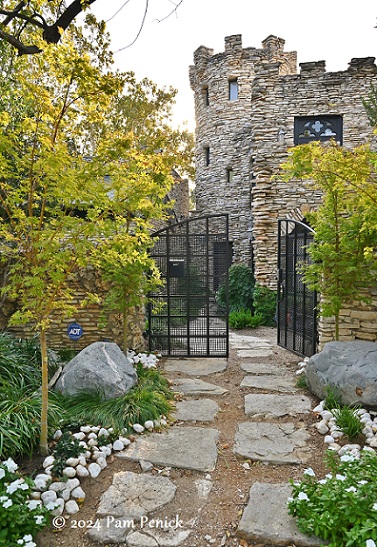
A couple of weeks ago, I was delighted to get a private tour of the grounds with John Garrett, a garden designer who’s working with the owner to rework the landscaping. He’s created a bit of a fantasy-scape, which seems appropriate for such a whimsical, Old World structure. Along the rustic front walk, four coral bark Japanese maples stand guard, one day to arch over the path in an echo of the gate. Round stones of white marble are loosely scattered along the path, setting off liriope and vinca groundcovers.
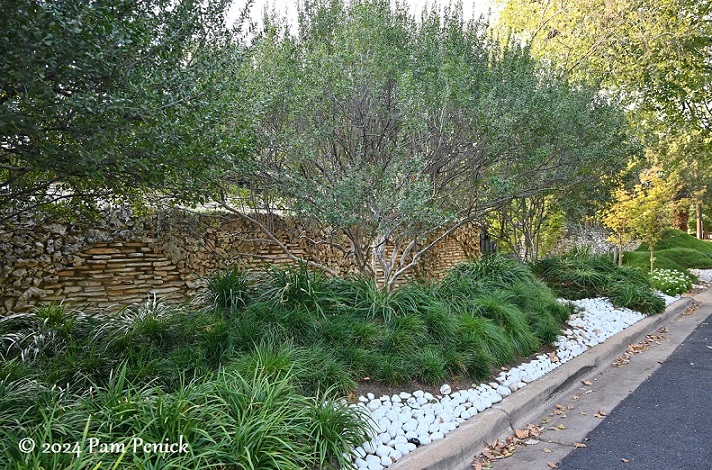
Outside the stone wall encircling the castle, John made an unconventional choice: he sculpted undulating berms (a reverse moat?) into a wave-like ribbon of greenery accented with marble cobbles.
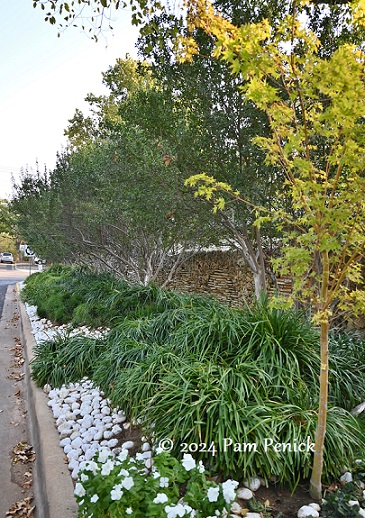
Long view
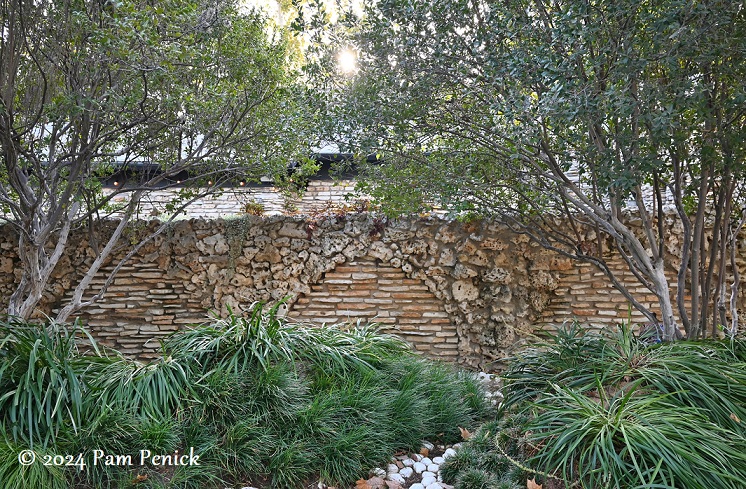
The stacked limestone wall with gothic arches of holey rock was already there, as were mature Texas persimmons.
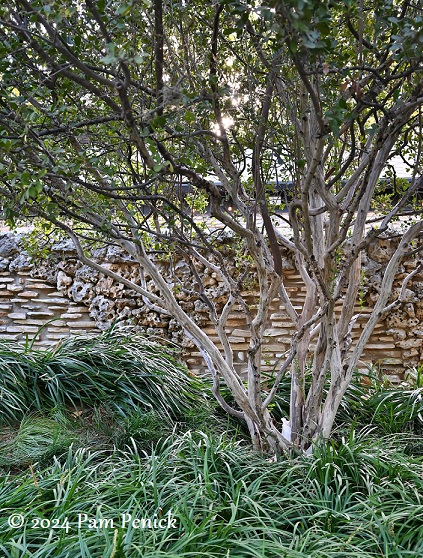
John threaded the berms around the trees and planted them with ‘Big Blue’ liriope and Berkeley sedge. I asked John about the persimmons’ root zones, aware, due to tree losses in my own yard, of how trees can succumb if their surface roots get suffocated by soil or mulch. He is confident that these are protected, but I mention it here so that anyone gardening around existing trees knows to leave a buffer so the roots can get air.
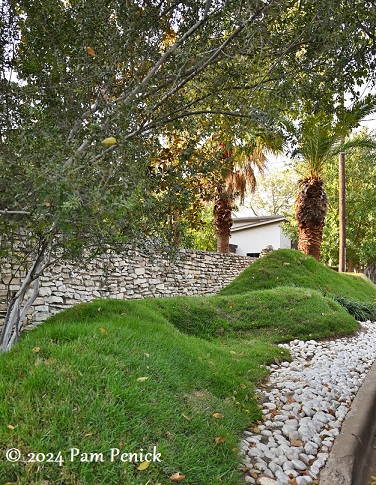
In the other direction, the berms are clothed with a shorter grass — zoysia, I think. The berms were built up, John told me, with decomposed granite, compost, and rice hulls and topped with a foot of Thunder Dirt from Geo Growers — the good stuff. Never doubt the power of good soil to make plants happy.
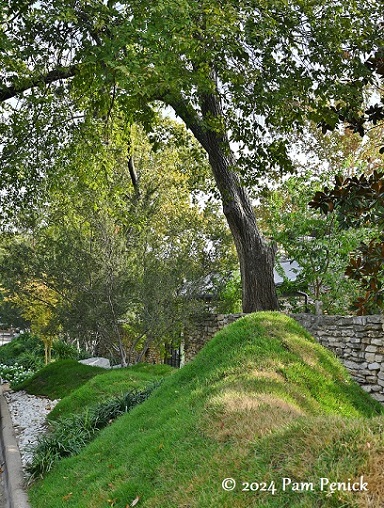
The back section of berming is tall, like a camel’s humps, which adds to the whimsicality of the landscaping. The grass was a little brown here and there after this droughty, hot summer, as one would expect. I asked John about watering, since berms shed water and dry out quickly. He said they do require extra watering. For me, that makes this a conceptual garden to appreciate like an art installation (see Cornerstone Sonoma’s gardens) rather than try to emulate, and that’s the spirit in which I’m sharing it with you.
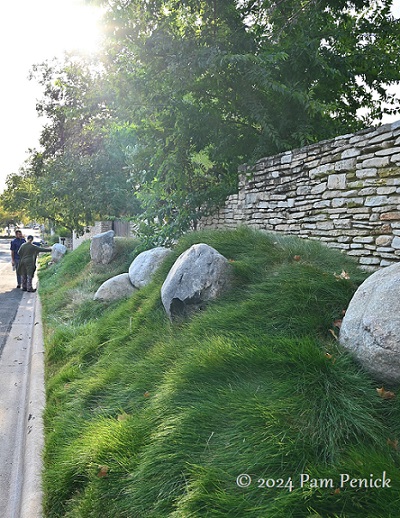
A sculptor himself, John has been greatly influenced by sculptors and land-art artists like Andy Goldsworthy, Maya Lin, and Isamu Noguchi. The meringue-like topography of Hawaii’s Kauai also inspired the castle’s landscaping. You can see all these influences along W. Mary Street, where shaggy ‘Palisades’ zoysia grass clothes sharp-ridged berms. White boulders perch improbably on the hills, looking as if they could roll into the street at any moment.
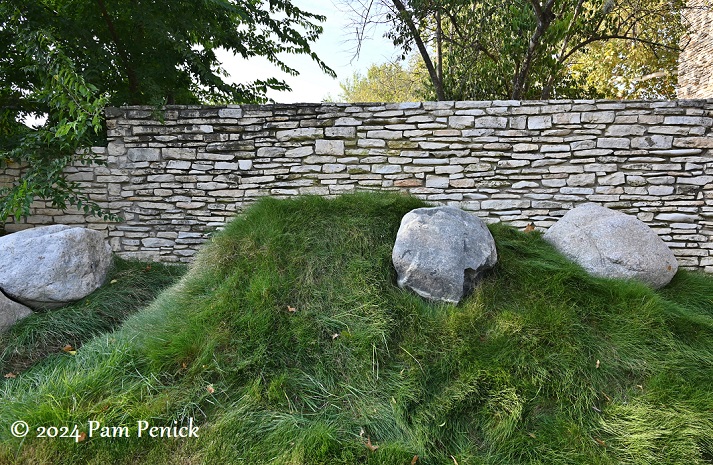
In actuality, the boulders are core drilled and attached to steel rods embedded in the berms. They are secure but meant to give a sense of motion.
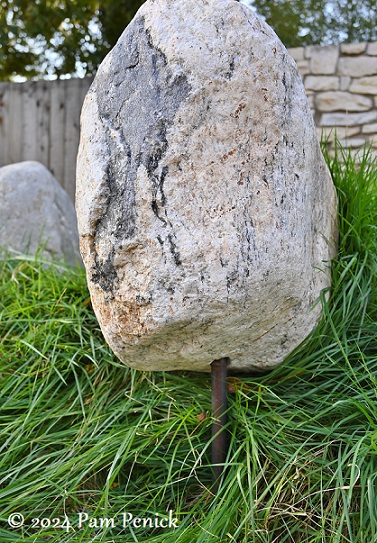
One boulder offers an extra surprise — it spins!
John demonstrates the secret interactivity, for those in the know.
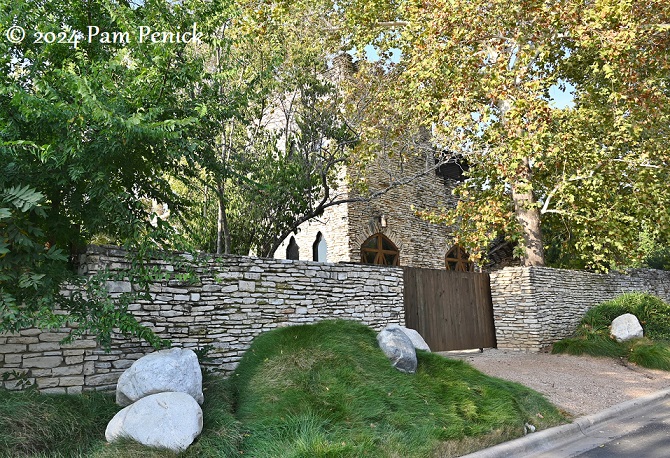
The berms offer a fantasy-scape of green, folded topography and alien rock. The goal is not naturalism, as is common in native-plant-loving Austin, nor formality, as a castle might suggest. It’s pure fantasy, a visual portal to another world.
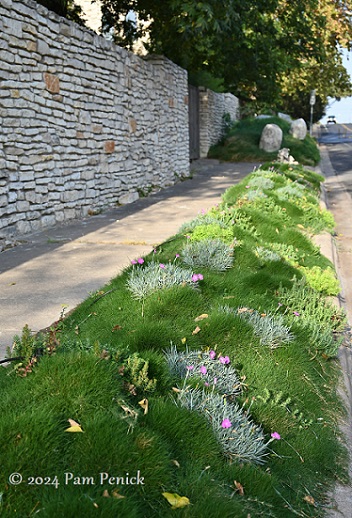
Along the last stretch of the narrow curb strip, John planted a tapestry of Korean zoysia grass, ‘Bath’s Pink’ dianthus, sedum, and other low groundcovers. He covers this section with frost cloth during winter freezes to keep the Korean grass green.
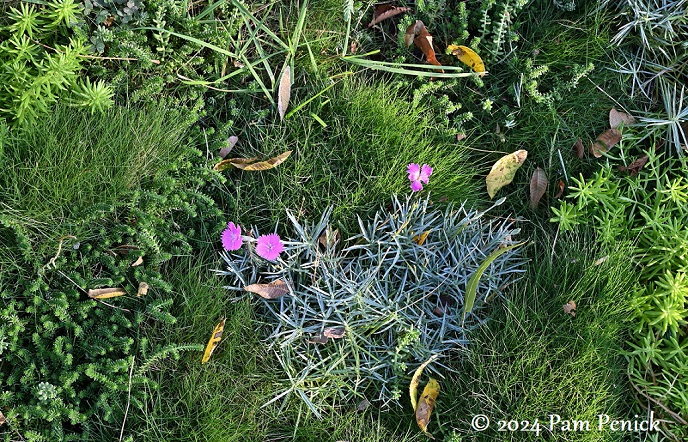
Groundcover tapestry
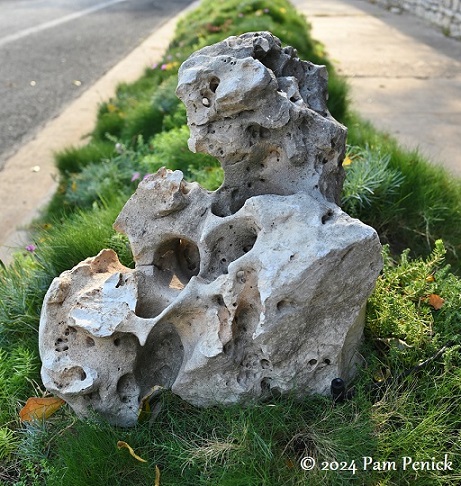
Limestone holey rock makes a sculptural accent.
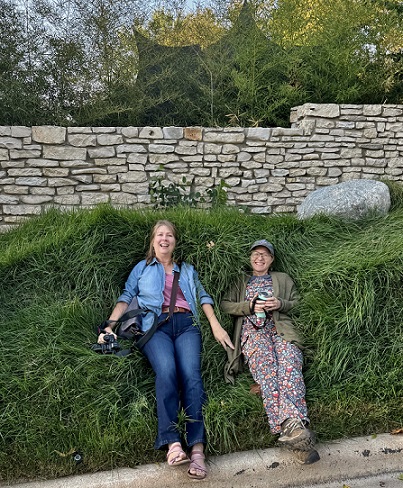
The tall berms were tempting for lounging. Lori Daul, who’d introduced me to John, joined me in falling back onto one. Surprisingly comfy!
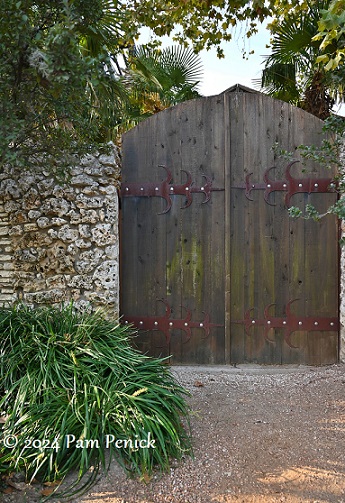
A driveway gate plays off the castle theme.
Inside the castle walls
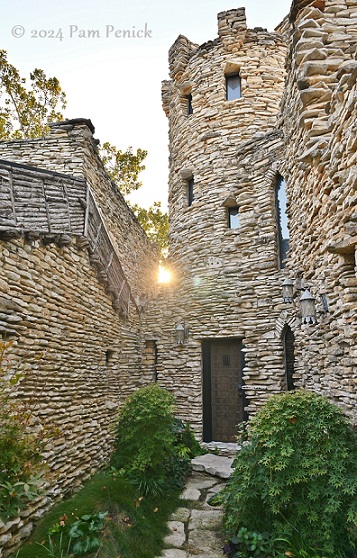
Inside the walls, John has only just started to redesign the landscaping. He added weeping dwarf Japanese maples and other shade lovers along a narrow walk to the door.
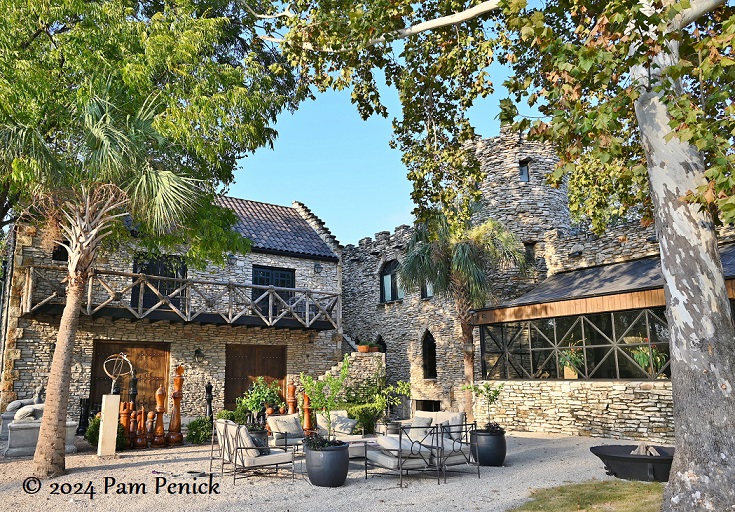
In back, plans are underway to redo a large gravel patio…
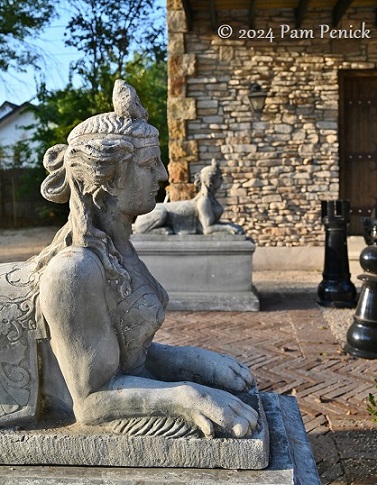
…where sphinxes currently watch over…
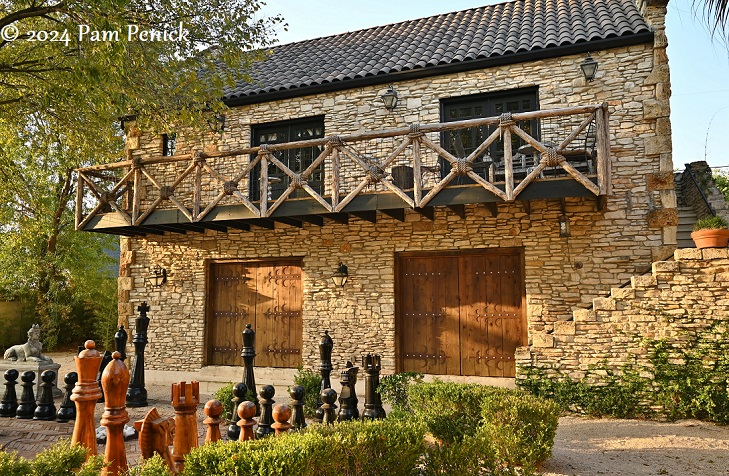
…a giant chess board.
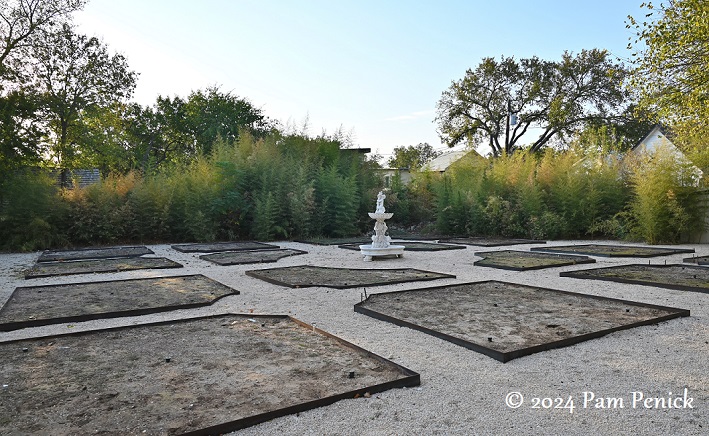
The castle’s extra-deep lot is divided into formal garden beds, which are on the way out, to be replaced with something new and different, John said.
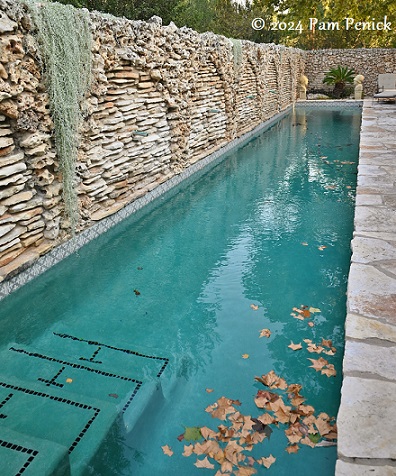
Behind the front wall, a turquoise lap pool follows the gothic arches.
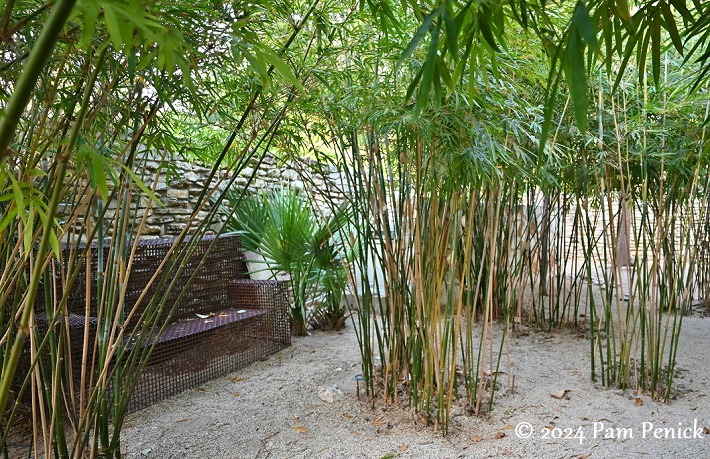
And a forest of clumping bamboo offers a hideaway for a steel-mesh sofa.
Thanks, John, for sharing this uniquely sculpted garden and the landmark Bouldin Castle with me!
I welcome your comments. Please scroll to the end of this post to leave one. If you’re reading in an email, click here to visit Digging and find the comment box at the end of each post. And hey, did someone forward this email to you, and you want to subscribe? Click here to get Digging delivered directly to your inbox!
__________________________
Digging Deeper
Come learn about gardening and design at Garden Spark! I organize in-person talks by inspiring designers, landscape architects, authors, and gardeners a few times a year in Austin. These are limited-attendance events that sell out quickly, so join the Garden Spark email list to be notified in advance; simply click this link and ask to be added. Read all about the Season 8 lineup here!
All material © 2024 by Pam Penick for Digging. Unauthorized reproduction prohibited.

